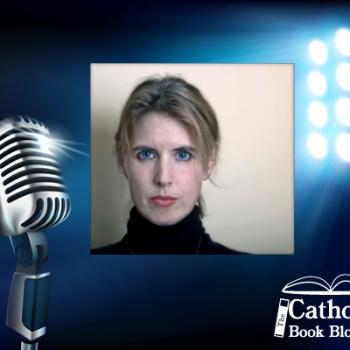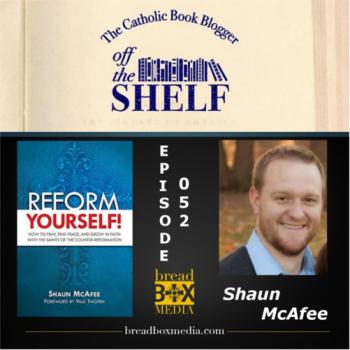 PETE: Being a convert to Catholicism myself, I enjoy hearing conversion stories of others. Can you share your own conversion story with those who have not read your book yet?
PETE: Being a convert to Catholicism myself, I enjoy hearing conversion stories of others. Can you share your own conversion story with those who have not read your book yet?
SHAUN MCAFEE: Sure, and thanks for asking. My journey began small. I knew little of Catholics but thought they were cool because they had incense, candles, real wine, shorter services, robes, and even footrests (which later I found to be kneelers). Haha. That ignorance took me into my early 20s when I realized I need something better in my life, and was unsure Christianity would be the solution. I gave it a try, though, telling God, “I don’t know what to do tomorrow or if I will remember this, but please help me.” He did. I got going quickly in Bible studies, small groups, mission work, and service to others. I was excited.
It was that way for some years but soon after getting married I became very interested in approaching Christianity on a more intellectual level, wanting to know more about its history and why we believe what we believe. That led me into some light apologetics, which was really enticing. But rapidly, I found myself wrestling with my own faith: Why are there all sorts of denominations? Why is everyone picking and choosing how they live this faith, what they believe, or tell others to believe? I stood every chance of being wrong as they, so what made my beliefs absolutely correct? It seemed queer that we had 1500 good years of dogma, defeating the world’s worst heresies, but couldn’t agree on things that were never questioned before the Reformation. I was dissatisfied, but hopeful.
Then I met a man who was a very good lay apologist, and happened to be a Catholic. I challenged him, and with every challenge, I found my arguments invalid or very poor in comparison. One by one, I found less satisfaction in my own faith, but I certainly didn’t want to be Catholic. After all, Catholics were certainly wrong, right? In the meantime, this guy’s faith grew on me. He told me stories of the Saints, the beliefs of the earliest Christians, and to my dismay, I was able to verify his stories in secular and Protestant history books. I was baffled.
A day came when he handed me a copy of Rome Sweet Home and I didn’t get the theological treatise I wanted, but it was great to hear a story of another struggling convert. I was willing, but needed some questions reconciled. There happened to be a book that Scott and Kimberly Hahn said gave them that boost, by James Cardinal Gibbons, titled The Faith of Our Fathers. I couldn’t put it down and within 7 chapters, I told myself, “I don’t want to be a Christian if I cannot be a Catholic.”
Soon after, I entered into my local parish’s RCIA program, and entered the Church in April 2012. It’s been a blast.
PETE: You raise some very good points and give many great pointers throughout your book Filling Our Fathers Heart. What was the driving force behind you writing this book?
SHAUN MCAFEE: First, I had to realize that this is not my book. It’s God’s book. I’m glad “Our Father” is in bolder and bigger letters than my own name on it. That said, I wanted to make a contribution to the Church that was different, needed, timely, and necessary. I wanted to write the book that the New Evangelization seemed to be missing and I felt that I personally had the capacity for the topic, given my previous experience and insight as an evangelical.
The concepts in the book are not novel, they aren’t anything new; they are simply a collection of the actual things evangelicals do that should be emulated, much of which converts bring with them that put them over the top. A lot of Catholic authors are always talking about the need for evangelization, but nobody is really showing people exactly how to do this and that, let alone identifying what this and that actually are. I wanted to write a book that talked specifics, and I think this book does that. Mission accomplished!
PETE: You discuss the New Evangelization in the opening chapter of your book. Some people can be intimidated by their role in the New Evangelization. What pointers do you have for them?
SHAUN MCAFEE: The first Christians didn’t have a catechism, blogs, or the many robust apostolates that support the Church today. They had conviction and confidence! The modern evangelist, which is a trait and calling for all Catholics, requires three ingredients: 1) the Sacraments, 2) God’s word, and 3) involvement. When live a life that is built in the Grace available in the Sacraments, have our nose in Sacred Scripture, and tell ourselves that we have a place to serve and make a difference, we every reason for confidence in our mission and place in the New Evangelization. That’s a good place to start and stay.
PETE: Early in the book you talk about people delivering their personal testimonies. How can our personal stories draw others to the Church?
SHAUN MCAFEE: In one way or another, for one reason or another, we find solace in the stories of people because we can relate to other people. It’s all about relationship. Relationships are like gravity: we depend on them daily. There are certain people in our lives who have made profound impacts on our lives from acts big and some acts of seemingly little significance. That might be a parent or friend who cultivated our worldview and life, or a complete stranger who planted a small seed that later cast a huge shadow over us, gracing us with fruit we could not have seen coming.
Testimonies do that particularly well. When we hear what God has done in the lives of others, we grow. When we share our stories with others, we inspire. Each of us, whether convert, revert, or cradle Catholic, have a moving testimony to share of what God had done in our hearts. St. Peter tells us to “always” be ready to talk about this (1 Pet. 3:15), and that chapter tells exactly how that is done, step by step.
PETE: I found the chapter Read the Bible Regularly to be chock full of great information. With everything that was in there you had to have a hard time narrowing the list. What did you leave out?
SHAUN MCAFEE: You know what? This was my first book and I was gently told to be prepared to, “kill my darlings,” meaning a huge facelift to some sections was possible. It was true. Sophia helped craft this book to what it needed to be, nipping here and having me add there. The funny thing is that the chapter on the Bible was pretty much unscathed in that process. If anything, it grew to be more detailed. As far as chosen content, I added just about everything I thought would be in-scope, relevant, and helpful. I suppose I left out anything directed to hermeneutics, interpretation, and other more scholarly activity. Glad you liked that chapter!
PETE: Time for my signature ending question. This is a blog about books. What is currently on your bookshelf to read?
SHAUN MCAFEE: I read a lot, and a lot of different kind of books at once. For having just completed my Master’s in Theology with Holy Apostles College and Seminary, I thought my reading list would shorten. No sir! I review books and I still study a fair amount as well. So here’s what’s currently on my plate:
The Relevance and Future of the Second Vatican Council, Ignatius Press
Vatican Council Notebooks, Ignatius Press
Catholic Realism, En Route Books and Media
For God and Country, Sophia Institute Press
Tweeting with God, Ignatius Press
_____________________________________________________________________________________________________










